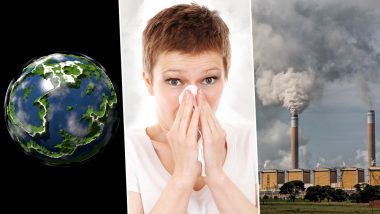As United States President Donald Trump continues to avoid the existence of global warming, doctors in China has published a report exclaiming the impacts of climate change on health. According to the report published by The Lancet medical journal, health experts have explained that the global warming that is causing storms, floods and fires could drastically impact the health of people.
The experts have noted not just the direct causes of global warming on health, but also indirect ways in which it could affect the normal well being of humans. For instance, storms and floods could shut down hospitals, spread diseases due to air pollution and an increase in mental health problems as people will continue to lose their homes and other property. Global Warming Increasing Death, Disease Risk: Study.
The Lancet report is produced by doctors and policy experts from 27 organizations around the world. They have called for quick action to find ways to control climate change prepare for growing health-related challenges.
"A rapidly changing climate has dire implications for every aspect of human life, exposing vulnerable populations to extremes of weather, altering patterns of infectious disease and compromising food security, safe drinking water and clean air," it warned. World Mental Health Day 2018: Global Warming and Climate Change Have Been Causing Depression, Anxiety and Suicidal Behaviour.
Increase in Diseases Caused Due to Global Warming
- People may have prolonged allergies due to an increase in presence of carbon dioxide in the air resulting in sneezing, watery eyes, worsening cases of asthma and other similar problems.
- COPD, a group of lung ailments caused due to smoke inhalation will rise.
- As glaciers melt, there will be an increase in unclean water supply. All of the water will not evaporate thus compromising with the drinking water.
- Breathing air filled with precipitation and pollen will result in acute and chronic airway diseases.
- Warm temperature will provide a good breeding ground for mosquitoes increasing waterborne diseases. Diseases will also spread through food due to rise in temperature. When the food comes in contact with pathogens, it will make food unfit for eating.
- The World Health Organisation (WHO) says that climate change is expected to kill approximately an additional of 2,50,000 people every year, mostly due to malaria, diarrhoea, heat stress and malnutrition.
Compared to 2000, more 157 million people were exposed to heatwaves last year, which is a 60 percent increase from 2009. It mostly affected construction workers, those in farming affecting family income. Watts said that the number of work hours fell by almost 7 percent in 2017. Cities are more affected as cities trap that and have hotter surrounding areas. It says that England and Wales saw more 700 deaths during 15-day hot days in June and July this year. Arctic Sea is Full of Plastic Junk, Could Flood Oceans All Over with Global Warming.
Compared to Africa and Southeast Asia, Europe and the eastern Mediterranean appear more vulnerable to the above problem. The main reason for this is the number of old people who live in cities that tape heat.
The Baltic region has seen a 24-per cent increase in coastal areas suitable for cholera outbreaks since 1950. And in sub-Saharan Africa's highlands, there has been a 27 percent increase in zones where malaria-carrying mosquitoes can survive. Higher temperatures will also affect harvest thus causing a food shortage. In the coming years, mental health problems will be on rising with children worried about their future and families concerned by financial loses caused due to disasters.
Experts have been demanding swift action to curb global warming problems since quite a long time. However, there has been no considerable difference in carbon footprints produced by nations. A recent UN report said that if immediate action is not taken to limit the global warming to 1.5°C, which at 2°C, the world could see 10cm more global sea level rise, loss of all coral-reefs and worsening food shortages. The Intergovernmental Panel on Climate Change (IPCC) had said that limiting global warming to 1.5°C will require "far-reaching and unprecedented changes."
(The above story first appeared on LatestLY on Nov 29, 2018 05:57 PM IST. For more news and updates on politics, world, sports, entertainment and lifestyle, log on to our website latestly.com).













 Quickly
Quickly





















